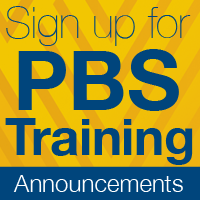
Winter 2018
Improving Behavior: Know your ABC's
Download a copy of the Winter 2018 Support Report
When we attempt to improve behavior, it is important to consider the circumstances and interactions that have set up the current pattern of behavior. Something about it works well enough for them to continue doing it so we have to identify why it works and teach a better way of doing things. This requires effort, consistency and focus.

Step 1: What is the behavior you wish to change?
Consider its impact and where you want to see it go.
- Is it a challenging behavior you want to decrease?
- Is it a positive behavior you want to increase?
- Will changing this behavior benefit the person in a meaningful way, or will it just be a relief to others around them?
Step 2: What does the behavior look and sound like?

No one can keep track of all the different behaviors someone engages in. Focus on one or two behaviors and give them clear definitions that reflect the most important things to record and change. Define them in a way that anyone could recognize them happening or not happening.
- Specific words (physical threats against others; saying please)
- Characteristics (volume above conversation level; leaving without permission)
- Actions (hitting; brushing teeth independently; finishing homework)
A clear understanding of the relationship between the Antecedents, Behaviors, and Consequences of an individual’s behavior is key to improving that behavior. Use clear and focused definitions and track what happens before and after the behavior to understand why it is happening.
Step 3: How will you record information on the behavior(s)?

There are many different ways to record information on a behavior. It is important to keep it simple, doable and respectful. Include information on successes as well as challenges.
- Counters, log books, tally marks
- Smartphone apps
Step 4: What types of things precede and follow the behavior?
Now that you have defined the behavior and can quickly recognize and record it, you can begin to determine why the behavior is happening.
Antecedents are events that happen before the behavior. They can be clues to what triggers the behavior:

- Being denied or ending a favorite activity
- Boring social setting, interactions or activity
- Long amounts of time spent doing an activity
- Not having the time, materials, or skills needed to complete a task
Consequences are events that happen after the behavior. They can be clues to what drives the behavior:
- Attention from others
- Access to an item or activity
- Escape from or delay of something they do not like
- Sensory stimulation
Purpose of the Positive Behavior Support (PBS) project
The purpose of the PBS project is to build the state’s workforce and community capacity to support individuals with developmental and intellectual disabilities, traumatic brain injuries and co-existing disorders relating to the prevention and treatment of challenging behaviors and improving quality of life. Through training and consultation, we promote supportive, motivating and inclusive environments for individuals with complex needs.
What is PBS?
PBS is an approach for teaching new skills to replace challenging behaviors and redesigning the environment to enhance quality of life. PBS operates from a person-centered values base, allowing the participant to guide team decisions about their lives. This approach is positive, proactive and focuses on preventing challenging behaviors before they occur.
Overview of project activities
The following project activities can help you improve challenging behaviors:
Training and continuing education opportunities
- A variety of trainings for professionals
- Social work CEU's
Technical assistance and mentoring
- Guidance and feedback to professionals
- Solutions for challenging behaviors
Person-centered planning
- Develop personal goals
- Create an action plan for achieving goals
Short-term individual assistance
- Serve a very limited number of individuals and families statewide
- Individuals must have dangerous behaviors and no services in place to address them
To learn more about the PBS project, register for a training, or subscribe to the quarterly Support Report newsletter, please visit pbs.cedwvu.org. Questions? Topic suggestions? Phone: 855-558-4296 Email: pbs@hsc.wvu.edu
The Positive Behavior Support Project is funded through a grant with the West Virginia Department of Health and Human Resources, Bureau for Behavioral Health and Health Facilities.

